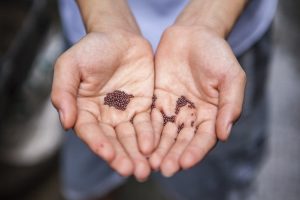Who Am I, and Who Can I Become? A Lesson on Heavenly Mother

By Meghan
I started off by writing the lesson title on the board – “Who Am I, and Who Can I Become?” I told the young women that we would be learning from this lesson outline but with a twist.
I told the young women that a few weeks ago, I had had this crazy idea for Mother’s Day. I told them how I has talked to the Bishopric and Young Women presidency about my crazy idea, and after some thoughtful prayerful and consideration, everyone was supportive of it. Then I told them my crazy idea – which was how cool would it be to talk about Heavenly Mother on Mother’s Day. (I told them this back story because I wanted them to know that the Bishop and YW presidency were ok with it.)
Some of the young women were so excited, which made me even more excited about teaching this lesson.
I explained that before going any further, we needed to address whether it was okay to even talk about Heavenly Mother. I asked them if they had ever heard that we shouldn’t talk about Her, and they all had. I basically said, “This idea that we shouldn’t talk about Heavenly Mother has never been repeated by any Church President, Apostle, or other General Authority.” (source: BYU Studies article “‘A Mother There’: A Survey of Historical Teachings about Mother in Heaven”) Not talking about Her is more of a cultural pattern than a doctrinal one – meaning that even though we have a culture in the church of not talking about Her, there is nothing doctrinal that says we can’t or that we shouldn’t. The claims that we shouldn’t talk about Her or that She is too sacred to talk about are not true. It’s ok to talk about Heavenly Mother in the same way that it’s ok to talk about Heavenly Father, which is with respect.
I wanted to be very clear and direct with the young women. I said, “I want you to know that while we’re learning from this lesson outline, you’re going to hear references to Heavenly Mother today, and I want you to know that it’s ok.” I made sure that they were all ok with it before moving on.
Then I told them about the two resources I’d be using in addition to the lesson outline. 1) the church’s Gospel Topics Essay on Mother in Heaven and 2) the BYU Studies article “A Mother There,” which is cited in the Gospel Topics Essay.
I had the young women read out loud the first paragraph of the lesson outline. I had printed out the first sentence and put it on the board: “We are beloved spirit daughters of heavenly parents, and, as such, we have a divine nature and destiny.” I asked them what it meant to them to know that they were a child of God, and to think about how it affected their lives or how they treat others.
Then I posted on the board the first sentence from the young men’s outline of the same name. It said: “We are sons of Heavenly Father, created in His image, with the potential to become like Him.” We didn’t dwell on this for very long because I then told them how I had adapted this for the young women, and I put this on the board: “We are daughters of Heavenly Mother, created in Her image, with the potential to become like Her.”
When I put that up, it was like minds were blown! It was really cool to see the young women think about this, and an almost sacred silence fell on everyone. Then I shared how despite not knowing much about Heavenly Mother, I believed that I had the potential to become like Her. And that even though I don’t quite know what that looks like, the idea feels right, and I find it very powerful.
Next we played 20 questions – the guessing game. I passed around a small container of seeds and told the young women they could only ask 20 yes or no questions to try and guess what kind of seed it was. It was a slow start, but somehow it only took 4 questions to get it right. It was a radish seed!
I asked them how we, as children of God, were like seeds. Some great answers here. Obviously potential to become like God was what I was thinking, but people also talked about nourishing that potential, etc. We read 1 John 3:2, which states: “Beloved, now are we the sons of God, and it doth not yet appear what we shall be: but we know that, when he shall appear, we shall be like him; for we shall see him as he is.” We discussed this question: “What does this teach you about who you are and who you can become?” I loved thinking about this scripture in terms of Heavenly Mother. The bishop, whom I had invited to sit in on the class, commented on the importance of getting to know our Heavenly Parents.
Then we read the quote by President Gordon B. Hinckley: “The whole design of the gospel is to lead us onward and upward to greater achievement, even, eventually, to godhood.” (“Don’t Drop the Ball,” Ensign or Liahona, Nov. 1994, 48). I also could have added here the quote by Elder Dallin H. Oaks of the Quorum of the Twelve Apostles who said, “Our theology begins with heavenly parents. Our highest aspiration is to be like them.” (Dallin H. Oaks, “Apostasy and Restoration,” Ensign, May 1995, 84. (This quote is from the gospel topics essay on Heavenly Mother.)
Then I told the young women that I needed their help deciding what resource to learn from next, kinda like a choose your own adventure story. After all, this lesson was for them, and I wanted them to be able to have some choice over what they were learning. Plus, I wasn’t sure how everything would be received (it was very well received). I gave them three options: 1) The Gospel Topics Essay, 2) The BYU Studies article, or 3) The conference talk “Value Beyond Measure” from Joy D. Jones. The majority of the young women were most excited about reading the Gospel Topics Essay, so that’s what we did. We then talked about what stood out to them, or what they learned about it, and they had some great thoughts and insights to share!
If the young women had wanted to talk about the BYU Studies article, I had selected my favorite quotes from it and would have planned on reading those.
For the Joy D. Jones conference talk, I had planned on putting the young women into groups and assigning them different portions of the talk. I would have had each of the three groups read the story of one of the young women who had discovered her worth. The discussion question would have been: “How was the young woman in your story affected by knowing her worth as a daughter of God?” I had also highlighted the quote from Spencer W. Kimball (which referenced a Heavenly Mother) and Sister Jones comments on worth vs. worthiness. I might also add as a discussion question: “How can knowing your worth as a daughter of God affect you?”






4 Responses
Thanks for sharing this experience and the details about how you taught the lesson! I wish that teaching YW about Heavenly Mother was built into the curriculum (and the YW theme). I was asked to talk in sacrament meeting on Mother’s Day this year and I spoke entirely about HM, using the same sources you used for your lesson. It was exhilarating and I’ve never had such positive feedback about a talk I’ve given.
Hi, I’m a convert and one of my motivations for joining the church was that the church had a tradition of Heavenly Mother. Then I got the she is too sacred to talk about routine. I have studied and participated in world religions so my conclusion was these men knew nothing
About the subject. So I did some research on my own and was delighted to find there indeed
Was information about her. I find it silly that we call God, God but our Mother in heaven is not called Goddess. Traditional language is a never ending source of amusement for me.
I’m now 64 and have been reading and studying the spiritual texts on my own since I was five. I used to hate the king James, preferring the newer more modern texts. But as I’ve
Grown older I have learned to love the flowery text, and wonderful more formal language of
King James. Love to the interesting and intriguing articles here. Bravo!
I’m a Mia Maid advisor teaching in a couple of weeks, and I’m dang sure picking the Godhead to speak on so that I can incorporate our Heavenly Mother in there 🙂 Plus I’ve decided on a personal level that when I recite the YW theme with the girls I’ll be saying “we are daughters of our heavenly father and mother; they love us and we love them”
I love this post. Thank you so much for writing it. It echo’s so many of my own tender feelings and I was so happy to stumble upon it the night before I get to teach my sweet group of young women about their worth and what they can become. I loved your resources as well. Thanks for posting all of it! xoxo